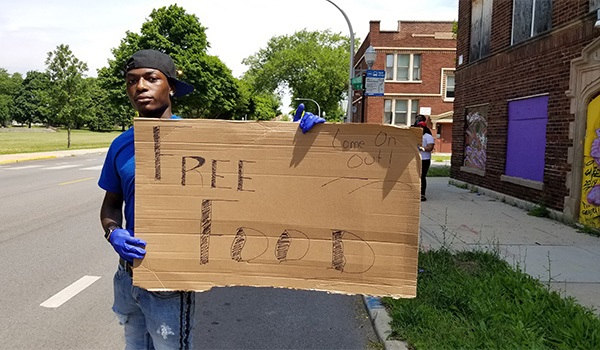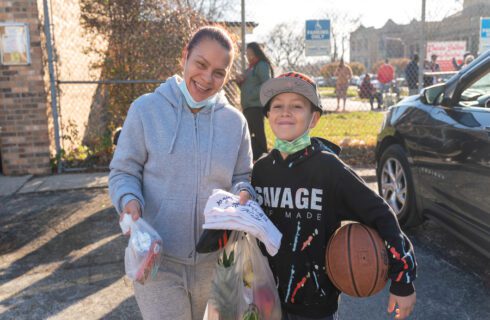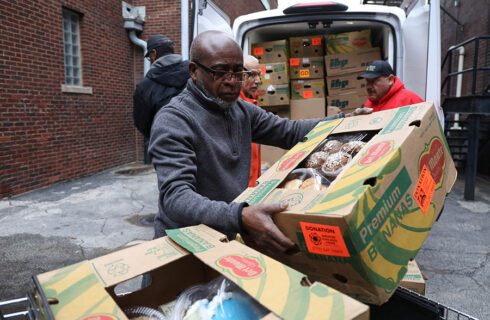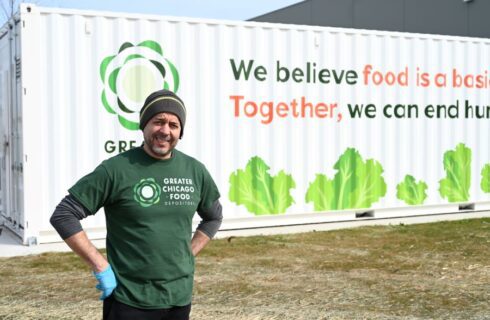On a tranquil Monday morning in Englewood on Chicago’s South Side, volunteers flagged down passersby on Racine Avenue with signs that said “Free Food.”
Some drivers heeded the invitation and pulled behind Perkins Bass Elementary School where volunteers hoisted boxes of fresh produce and dry goods into their cars. The mood was buoyant and the music lively.
“God bless y’all,” said a woman who rolled down her window and beamed after receiving food.
For the next five weeks, ending July 27, the new food distribution will take place on Mondays from 10 a.m. to 12 p.m. Since early May, the Greater Chicago Food Depository has launched similar “pop-ups” in partnership with community groups in Black and Brown communities on Chicago’s South and West Sides that have been hit hard by the combination of COVID-19 and increasing food insecurity.
The new pop-up represents a powerful collective of neighborhood organizations: Teamwork Englewood, Grow Greater Englewood, St. Bernard Hospital and the office of 16th Ward Ald. Stephanie Coleman. Together, in partnership with the Food Depository, they hope to expand food access in the community during the ongoing pandemic and beyond.
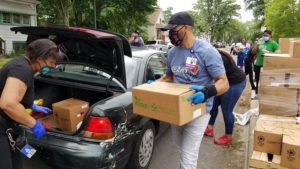
Volunteers with St. Bernard Hospital load boxes of food into a car at the Englewood pop-up.
“Since the last couple of months, what we’ve learned is that there are lot of folks who can’t always go to the stores regularly while they’re sheltering in place,” said Cecile DeMello, executive director of Teamwork Englewood. “This will allow some of our families to have a head start on a healthy summer.”
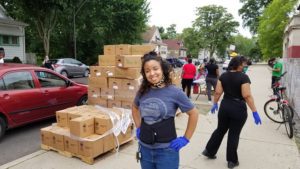
Cecile DeMello, executive director of Teamwork Englewood, volunteers at the pop-up food distribution.
The pandemic has significantly increased hunger throughout the Chicago area and across the country. Black and Latino neighborhoods already at higher risk of food insecurity – often neighborhoods with high poverty and unemployment rates because of years of disinvestment and systemic racism – have also been disproportionately affected by COVID-19.
In May, the Food Depository and its partners served about 17,720 people in Englewood – almost triple the 6,035 people served in January, according to Food Depository data.
Even before the coronavirus pandemic, more than half of population in Englewood was considered to be at risk of food insecurity, according to the Food Depository’s food insecurity index, which considers factors such as unemployment, income and renter occupancy.
Access to food is also a primary social determinant of health, said Diahann Sinclair, vice president of organizational and community development for St. Bernard Hospital. Access to a livable wage, quality housing and transportation also affect a person’s health, Sinclair said.
“It’s much larger than just food, right?” Sinclair said. “All of these factors affect your overall health. So as an institution, we are trying to see how we expand our view of health and how we can impact those other social determinants of health. This is one opportunity.”
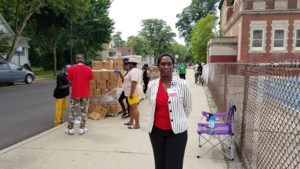
"It's hard to function if you're hungry," said Diahann Sinclair of St. Bernard Hospital.
While the pandemic has laid bare the racial disparities that have existed for years, the demands for a more just and equitable society have grown louder with the protests following the Minneapolis police killing of George Floyd.
It’s time to revisit the need for reparations for disadvantaged Black communities like Englewood, said Anton Seals, lead steward of Grow Greater Englewood.
“It’s necessary at this point,” Seals said. “If we don’t resolve these big issues now, if we don’t take bold steps, if we don’t have a New Deal for these kind of communities, then we’re going to have more of the same.”
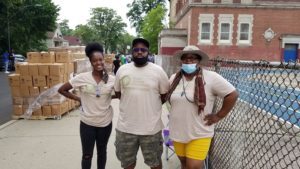
Anton Seals, center, lead steward for Grow Greater Englewood, at the pop-up with two of his fellow volunteers.
The challenges are real, but so too are the considerable hopes and efforts of the Englewood organizations working every day to improve the quality of life in their community.
Both Teamwork Englewood and Grow Greater Englewood are committed to expanding access of fresh fruits and vegetables in the neighborhood. A proud South Side neighborhood, Englewood also has a vibrant community of urban farmers and small businesses that could play an important role in reducing food insecurity in the years to come.
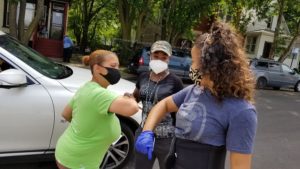
Dionne Frye, on left, of Mothers Against Street Shooters exchanges an elbow bump with Cecile DeMello of Teamwork Englewood.
The hope is that the pop-up distribution will provide relief in a crisis and be a springboard for more partnership in the years to come.
On Monday, there were glimpses of what’s possible. Volunteers loaded boxes of food into a St. Bernard Hospital van that would transport the goods to older adults who have trouble leaving their homes. Another carload of representatives from the Mothers Against Street Shooters group set off to do the same.
“It’s an example of what we can do to be successful in the city,” Sinclair said. “Collaborate, focus on the needs and not the individual objectives, and I think we could really make an impact in our neighborhood.”
If you need food assistance, please visit the Food Depository’s Find Food locator map to find the nearest food distribution to you.
Share This Post

